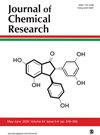利用越南棉花植物副产品合成活性炭以去除亚甲基蓝和刚果红
IF 1.2
4区 化学
Q4 CHEMISTRY, MULTIDISCIPLINARY
引用次数: 0
摘要
木棉活性炭是用微波辅助法与活化剂 NaOH 合成的。木棉活性炭的表面像珊瑚一样粗糙,呈无定形结构,表面官能团包括 O-H、C-H、C=C 和 C-O。其表面积和孔径分别为 395.48 m2 g-1 和 2.35 nm。评估了木棉活性炭对两组阴离子染料(刚果红)和阳离子染料(亚甲基蓝)的吸附能力,以评价影响因素并预测吸附过程。亚甲基蓝的吸附条件最佳(时间:30 分钟,温度:20 °C):30 分钟,温度亚甲基蓝(时间:30 分钟,温度:30 °C,pH:10,木棉活性炭 1 g L-1,亚甲基蓝 80 mg L-1,吸附容量 30.875 mg g-1)和刚果红(时间:150 分钟,温度:60 °C,pH:2,木棉活性炭 2 g L-1,刚果红 100 mg L-1,吸附容量 45.97 mg g-1)分别达到了最佳吸附条件。吸附过程符合 Bangham 动力学和 Dubinin-Radushkevich (D-R) 等温线模型。可重复使用性评估过程表明,木棉活性炭可重复使用 4 次。本文章由计算机程序翻译,如有差异,请以英文原文为准。
Synthesis of activated carbon from cotton plant by-products in Vietnam to remove methylene blue and congo red
Activated carbon from cottonwood was synthesized by microwave-assisted method with activator NaOH. Activated carbon from cottonwood has a rough surface like coral, an amorphous structure with surface functional groups such as O–H, C–H, C=C, and C–O. The surface area and pore size were recorded at 395.48 m2 g−1 and 2.35 nm. The adsorption capacity of activated carbon from cottonwood was evaluated on two groups of anion dyes (congo red) and cation dye (methylene blue) to evaluate the influencing factors and predict the adsorption process. The best adsorption conditions were recorded for methylene blue (time: 30 min, temperature: 30 °C, pH: 10, activated carbon from cottonwood of 1 g L−1 , methylene blue of 80 mg L−1 , and adsorption capacity of 30.875 mg g−1 ) and congo red (time: 150 min, temperature: 60 °C, pH: 2, activated carbon from cottonwood of 2 g L−1 , congo red of 100 mg L−1 , and adsorption capacity of 45.97 mg g−1 ), respectively. The adsorption process was consistent with the Bangham kinetic and Dubinin–Radushkevich (D–R) isotherm model. The process of evaluating reusability shows that activated carbon from cottonwood can be reused 4 times.
求助全文
通过发布文献求助,成功后即可免费获取论文全文。
去求助
来源期刊

Journal of Chemical Research
CHEMISTRY, MULTIDISCIPLINARY-
CiteScore
2.30
自引率
0.00%
发文量
66
审稿时长
1.0 months
期刊介绍:
The Journal of Chemical Research is a monthly journal which has a broad international authorship and publishes research papers and reviews in all branches of experimental chemistry. Established in 1977 as a joint venture by the British, French and German chemical societies it maintains the high standards set by the founding societies. Each paper is independently peer reviewed and only carefully evaluated contributions are accepted. Recent papers have described new synthetic methods, new heterocyclic compounds, new natural products, and the inorganic chemistry of metal complexes.
 求助内容:
求助内容: 应助结果提醒方式:
应助结果提醒方式:


